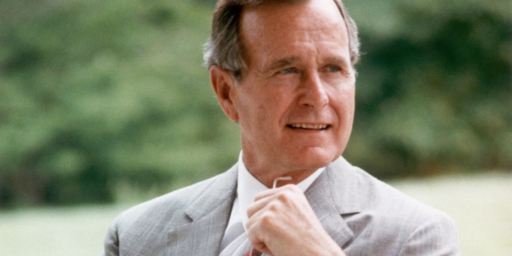Why Obama Brought Less Change Than Hoped
Why I wasn't fooled by Barack Obama's campaign promises to curb presidential power.
In the comments of my post “Obama Supports Warrantless Searches,” commenter Tom P gives me props as a prognosticator:
Back before the election James, you said (repeatedly) that Obama would fight to keep the excesses of the Bush administration and probably try to expand them. I disagreed, To say that I was naive is putting it lightly. Every time Obama has had a chance to surrender some of these “powers” he has fought to strengthen the hold the POTUS has on them.
Of course, I was far from alone in getting this one right. I find that, in politics, you seldom go wrong betting cynical.
More importantly, one of the great lessons that I took from my earliest American government courses as an undergrad was that politicians tend to play roles imposed on them by the offices they inhabit.
The Barack Obama of 2008 was a United States Senator and former state senator, community organizer, and conlaw prof. While I’m sure that, like most successful politicians, he was telling voters what they wanted to hear during the campaign, my guess is that he genuinely believed that presidential power should be curbed. After all, he’d always viewed it with either academic dispatch or from the standpoint of someone in a competing part of our governmental system.
But, come noon on 20 January 2009, Obama became President of the United States.
Suddenly, he had all of the pressures, perks, and incentives that George W. Bush had. He’ started getting barraged with intelligence telling him about all these awful threats to America and with an incessant cacophony of voices demanding that he do something about X, Y, and Z.
Suddenly, it made all the sense in the world that he ought to have the power necessary to do the job as he saw fit — without interference from the idiots on Capitol Hill and a bunch of unelected judges!
This is why we’re a government of laws, not men. Institutions matter. The Constitution matters. Not because the people we elect to office are evil — most of them aren’t — but because the natural human tendency of people in power is to push the limits of their authority to the maximum to do good.
At the extreme example, you get Richard Nixon and Enemies Lists. But it doesn’t have to go to criminal lengths to be dangerous. Especially, it seems, in times of crisis. Franklin Roosevelt is widely considered as one of our very best presidents and he managed to lock up over 100,000 Japanese Americans and bully the Supreme Court to go along.
While I disagreed with many of Bush’s post-9/11 policies, thinking they were unwise or even outrageous, it never occurred to me that they were anything but well-intentioned. And, while I disagree with Obama’s policy preferences generally and his attempt to stretch the national security letter program in particular, I’m sure he’s doing it for the best of reasons.
And, again, that’s why we have a Constitution and a Bill of Rights. Unfortunately, too many Americans seem not to care so long as their guy’s in charge.







Obviously any president is going to try to protect presidential prerogatives but there’s no doubt in my mind he’s cleaned up the goverment in a general sense. Gates (Bush’s best appointment along with Paulson) was kept on at defense, DOJ has been depoliticized, the hacks at interior, transport, HHS and energy replaced, and we now have regulators interested in regulating and not looking the other way. Is it the Nirvana thise at Kos expected? No, but it is a quantum improvement in terms of pragmatism and competence. My concern expressed on another thread is that we’ve completely gone overboard on security and created some huge machine that cannot be understood let alone controlled and has more holes than swiss cheese. If the cold war was still on the Soviet Union would be rubbing its hands at the prospect of nearly 1 million people with top security clearances.
I have to agree, James. There’s something about being president….I’m reminded of the Louisiana Purchase…Jefferson did it, even though he thought it might be unconstitutional, because he thought it was in the national security and economic interests of the United States. But he was the president.
@Joe
Nobody’s arguing that Obama and Bush have the same policy preferences. Bush opposed regulation in most cases as a matter of principle, while Obama enthusiastically approves. And, yes, Obama is a technocrat whereas Bush preferred loyalists.
But that really has little to do with this conversation.
@sam
Yup. Something can be both unconstitutional and a damn good idea, as was the Louisiana Purchase. But I’d rather occasionally have my policy preferences thwarted than give presidents carte blanche.
“But that really has little to do with this conversation.”
Only if you think the law and how it is applied can’t be very different. There were loads of financial regulations in place that could have prevented or at least mitigated the effects of the financial crisis but they just weren’t applied.
Yeah James, that is what you were saying then, and to some extent I even agreed with you (to the point where I don’t think I ever openly disagreed with you, just kept my own counsel) and as Dave S says above, human nature being human nature…
Still, I thought Obama would roll back at least SOME of the worst abuses…
Every time Obama ratchets up the security state and the war, I’m reminded of the Daniel Ellsberg anecdote about the limits of knowledge, as quoted here by Kevin Drum:
http://motherjones.com/kevin-drum/2010/02/daniel-ellsberg-limitations-knowledge
Given Obama’s fondness for experts and his cautious nature, along with the fear that a major successful terrorist attack would torpedo his administration, it’s not hard to imagine him acquiescing to almost every request that our intelligence apparatus makes.
@JJ
“Yup. Something can be both unconstitutional and a damn good idea, as was the Louisiana Purchase.”
That got me thinking. How did the LP go down back then? The wiki page says:
Nevertheless, the treaty – making the purchase official and final – was ratified 24-7 by the Senate.
Fascinating stuff, our politics, no?